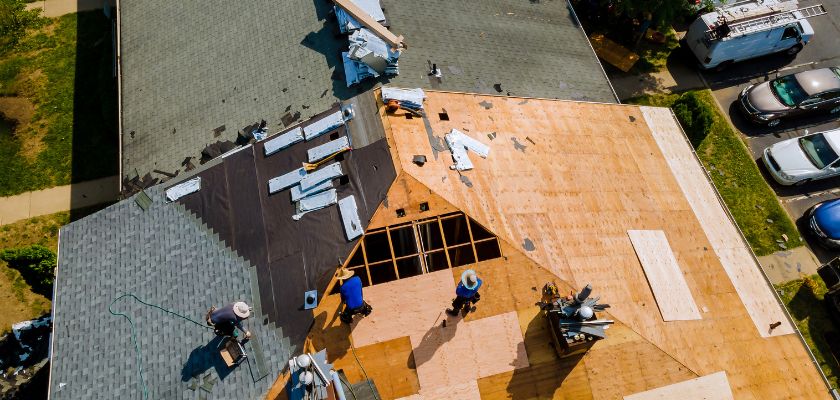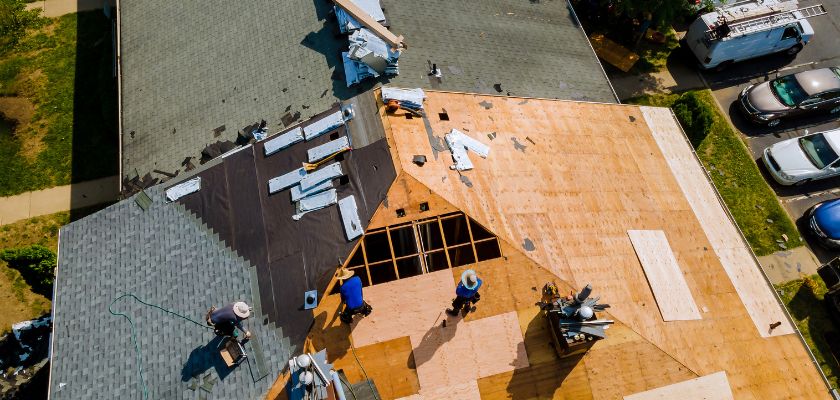Replacing your roof is one of the most significant investments you can make in your home. A well-installed roof not only protects your property from the elements but also enhances its curb appeal and value. However, the success of your roof replacement process heavily depends on the contractor you choose. Finding a reliable and skilled roofing contractor is crucial to ensure that your new roof is installed correctly and lasts for years to come. This article will guide you through the steps to find a trustworthy roof replacement contractor, with a focus on homeowners in Mesquite, TX.
Table Of Contents
Understanding the Roof Replacement Process

What to Expect During a Roof Replacement
Before diving into how to find a contractor, it’s essential to understand the roof replacement process itself. Knowing what to expect can help you communicate better with potential contractors and ensure that all aspects of the job are covered.
Initial Inspection and Assessment
The first step in the roof replacement process is a thorough inspection of your current roof. A professional contractor will assess the condition of your roof, identify any underlying issues, and determine whether a full replacement is necessary. This inspection helps in planning the scope of work and estimating the cost.
Removal of Old Roofing Materials
Once the decision to replace the roof is made, the next step involves removing the old roofing materials. This can include shingles, underlayment, and flashing. Proper removal is crucial to prevent damage to the underlying structure and to prepare the surface for new materials.
Installation of New Roofing Materials
After the old materials are removed, the contractor will begin installing the new roofing system. This typically starts with laying down an underlayment, followed by the installation of shingles or other roofing materials. Proper installation is key to ensuring the roof’s durability and weather resistance.
Final Inspection and Cleanup
The final step in the roof replacement process involves a thorough inspection to ensure that everything has been installed correctly and meets local building codes. The contractor should also clean up the job site, removing any debris and ensuring that your property is left in good condition.
The Importance of Choosing the Right Contractor
Choosing the right contractor for your roof replacement is crucial to ensure that the job is done correctly and efficiently. A reliable contractor will not only have the necessary skills and experience but will also be trustworthy, communicative, and respectful of your property.
Avoiding Common Pitfalls
Hiring an inexperienced or unqualified contractor can lead to numerous problems, such as poor workmanship, delays, and unexpected costs. In the worst cases, you may end up needing another contractor to fix mistakes, which can significantly increase the overall cost of the project.
Ensuring Long-Term Quality
A well-installed roof should last for decades, but this is only possible if the job is done right from the start. By choosing a reliable contractor, you can ensure that your roof replacement is completed to the highest standards, providing you with peace of mind and protecting your investment.
Steps to Finding a Reliable Roof Replacement Contractor

Researching Local Contractors
The first step in finding a reliable roofing contractor is conducting thorough research. Start by looking for contractors in your local area, as they will be familiar with the regional climate and building codes.
Checking Online Reviews and Ratings
One of the best ways to gauge a contractor’s reliability is by checking their online reviews and ratings. Websites like Google, Yelp, and the Better Business Bureau (BBB) offer customer reviews that can give you insight into the contractor’s reputation. Look for contractors with consistently high ratings and positive feedback from previous clients.
Asking for Recommendations
Word of mouth is another powerful tool in finding a reliable contractor. Ask friends, family, and neighbors if they have had any positive experiences with roofing contractors in your area. Personal recommendations can provide you with trustworthy leads and help you avoid contractors with poor reputations.
Verifying Credentials
Once you have a list of potential contractors, it’s important to verify their credentials. Ensure that the contractor is licensed, bonded, and insured. Licensing ensures that the contractor has met the necessary requirements to operate legally, while insurance protects you from liability in case of accidents or damage during the project.
Conducting Interviews and Obtaining Quotes
After narrowing down your list of potential contractors, the next step is to conduct interviews and obtain quotes. This will help you compare their services and prices, allowing you to make an informed decision.
Preparing a List of Questions
Before meeting with contractors, prepare a list of questions to ask during the interview. These questions should cover important topics such as their experience, the materials they use, their process for handling unexpected issues, and the timeline for the project.
Sample questions include:
- How long have you been in business?
- Can you provide references from previous clients?
- What type of roofing materials do you recommend for my home?
- How do you handle unexpected issues or delays?
Comparing Quotes and Services
After conducting interviews, request a detailed quote from each contractor. The quote should include a breakdown of costs for materials, labor, and any additional services. Be wary of quotes that are significantly lower than others, as this could be a sign of subpar materials or workmanship. Instead, focus on finding a contractor who offers a fair price for high-quality work.
Evaluating Communication and Professionalism
Pay attention to how each contractor communicates during the interview process. A reliable contractor should be responsive, clear, and professional in their communication. They should be willing to answer your questions and provide explanations without hesitation. Good communication is key to ensuring that the roof replacement process goes smoothly.
Checking References and Past Work
Before making a final decision, it’s important to check references and review the contractor’s past work. This will give you a better understanding of their capabilities and the quality of their workmanship.
Contacting References
Ask the contractor for a list of references from previous clients. When contacting these references, inquire about their overall experience, the quality of the work, and whether the project was completed on time and within budget. This firsthand feedback can help you gauge the contractor’s reliability.
Reviewing Portfolio of Past Projects
Many contractors will have a portfolio of past projects that you can review. This may be available on their website or provided upon request. Reviewing their portfolio allows you to see the quality of their work and determine if their style aligns with your preferences.
Inspecting Completed Roofs
If possible, ask the contractor if you can visit a few of their completed projects in person. Inspecting completed roofs can give you a better idea of their workmanship and attention to detail. Look for signs of quality, such as straight lines, consistent shingle patterns, and clean edges.
Understanding the Contract and Warranty

Reviewing the Contract Thoroughly
Before signing any agreement, it’s essential to review the contract thoroughly. The contract should include detailed information about the scope of work, materials to be used, payment schedule, and timeline for the project.
Scope of Work and Materials
Ensure that the contract clearly outlines the scope of work, including the specific materials that will be used. This includes the type of shingles, underlayment, and any additional components such as flashing or ventilation systems. Having this information in writing helps prevent misunderstandings later on.
Payment Schedule
The payment schedule should be clearly defined in the contract. It’s common for contractors to request a deposit upfront, with the remaining balance due upon completion of the project. Avoid contractors who demand full payment before the work begins, as this could be a red flag.
Project Timeline
The contract should also include a timeline for the project, including the expected start and completion dates. While some delays may occur due to weather or unforeseen issues, having a clear timeline helps ensure that the project stays on track.
Understanding the Warranty
A reliable contractor should offer a warranty on both materials and workmanship. Understanding the terms of the warranty is crucial to protecting your investment.
Manufacturer’s Warranty
The manufacturer’s warranty covers the roofing materials themselves, such as shingles or tiles. This warranty typically covers defects in the materials for a specified period, often 20-50 years depending on the product. Ensure that the contract includes details about the manufacturer’s warranty and how to file a claim if necessary.
Workmanship Warranty
The workmanship warranty covers the installation of the roof. A good contractor should offer a workmanship warranty that guarantees their work for a certain period, usually 5-10 years. This warranty provides peace of mind that the installation was done correctly and that the contractor will address any issues that arise during the warranty period.
Finalizing Your Decision and Moving Forward
Making Your Final Decision
After completing your research, interviews, and reference checks, it’s time to make your final decision. Choose the contractor who offers the best combination of experience, quality, communication, and price.
Signing the Contract
Once you’ve selected a contractor, review the contract one last time to ensure all details are correct. If everything looks good, sign the contract and arrange for the start date of the project.
Preparing for the Roof Replacement
Before the project begins, take steps to prepare your home for the roof replacement process. This may include clearing the area around your home, removing valuable items from the attic, and informing your neighbors about the upcoming work.
Monitoring the Project
During the roof replacement, it’s important to monitor the project to ensure that everything is progressing as planned.
Communicating with the Contractor
Stay in regular communication with your contractor throughout the project. Address any concerns or questions as they arise, and make sure that the work is being completed according to the agreed-upon scope and timeline.
Inspecting the Work
Periodically inspect the work being done to ensure it meets your expectations. If you notice any issues, bring them to the contractor’s attention immediately so they can be addressed.
Final Walkthrough
Once the project is complete, conduct a final walkthrough with the contractor to review the finished roof. Ensure that everything has been done to your satisfaction and that the job site has been cleaned up properly.
Final Wording
Selecting the right contractor for your Roof Replacement Mesquite, TX is crucial for a smooth and successful project. By conducting thorough research, interviewing potential contractors, and reviewing references and past work, you can find a reliable contractor who will deliver high-quality results. For homeowners in Mesquite, TX, investing the time to choose a reputable contractor is essential to protecting your property and ensuring that your new roof will stand the test of time. Whether you’re addressing a minor repair or a complete roof replacement, working with a professional ensures the job is done correctly the first time, giving you peace of mind and boosting your home’s value.
FAQ’s
1. How can I tell if my roof needs to be replaced instead of just repaired?
Signs that your roof may need replacement include widespread shingle damage, frequent leaks, missing shingles, and a roof that is over 20 years old. A professional inspection can help determine whether repair or replacement is the best option.
2. What should I look for in a roof replacement contractor?
Look for a contractor with proper licensing, insurance, and a strong reputation in the community. Check online reviews, ask for references, and verify their experience with the specific type of roofing material you want to use.
3. How long does the roof replacement process typically take?
The duration of the roof replacement process varies depending on the size of the roof, weather conditions, and the complexity of the job. On average, a typical residential roof replacement can take anywhere from 1 to 3 days.
4. What are the most important questions to ask a potential roofing contractor?
Ask about their experience, the types of materials they recommend, their process for handling unexpected issues, the timeline for the project, and details about the warranties they offer for both materials and workmanship.
5. How do I prepare my home for a roof replacement?
To prepare your home, clear the area around your house, remove any valuables from the attic, and inform your neighbors about the upcoming work. It’s also a good idea to make arrangements for any pets that might be disturbed by the noise.







